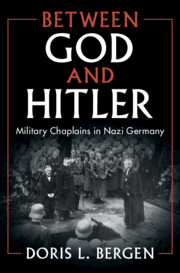Book contents
- Between God and Hitler
- Between God and Hitler
- Copyright page
- Contents
- Figures
- Table
- Preface
- Acknowledgments
- Note on the Text
- Abbreviations
- Introduction
- 1 “We Will Not Let Our Swords Get Rusty”
- 2 “In Times of Peace the Church Arms Herself for War”
- 3 “Gott mit uns”
- 4 Saving Christianity, Killing Jews
- 5 “The Power of Christian Truth and Christian Faith”
- 6 “What Should We Preach Now?”
- 7 From Nazi Past to Christian Future
- Conclusion
- Notes
- Bibliography
- Index
7 - From Nazi Past to Christian Future
1945 and Beyond
Published online by Cambridge University Press: 14 April 2023
- Between God and Hitler
- Between God and Hitler
- Copyright page
- Contents
- Figures
- Table
- Preface
- Acknowledgments
- Note on the Text
- Abbreviations
- Introduction
- 1 “We Will Not Let Our Swords Get Rusty”
- 2 “In Times of Peace the Church Arms Herself for War”
- 3 “Gott mit uns”
- 4 Saving Christianity, Killing Jews
- 5 “The Power of Christian Truth and Christian Faith”
- 6 “What Should We Preach Now?”
- 7 From Nazi Past to Christian Future
- Conclusion
- Notes
- Bibliography
- Index
Summary
Chapter 7 considers the Wehrmacht chaplains after World War II. Defeat and occupation created barriers but also possibilities. Christianity provided common ground with the Allies, including US, French, and British chaplains. Former Wehrmacht chaplains, like Werthmann, became spokesmen for German soldiers and mediators with the victors. Defeat opened roles, like ministering to POWs and imprisoned Nazis. In the Cold War context, chaplains presented themselves as having been a Christian bulwark against Nazi paganism and now against Communism. Thus chaplains who had legitimated the Nazi German war effort found ways to legitimate themselves. The chapter contrasts the Wehrmacht chaplains’ postwar roles with US Jewish chaplains, who became strong advocates for Jewish displaced persons. Popular culture continued to present the Wehrmacht chaplains as tragic heroes who had tried to uphold Christian ethics in the face of evil, but at the level of policy, the old model of military chaplaincy was repudiated. East Germany did not permit chaplains, and in West Germany, the new chaplaincy created in the 1950s was tasked not with boosting morale but with being a voice of conscience in the military.
Keywords
- Type
- Chapter
- Information
- Between God and HitlerMilitary Chaplains in Nazi Germany, pp. 203 - 228Publisher: Cambridge University PressPrint publication year: 2023

